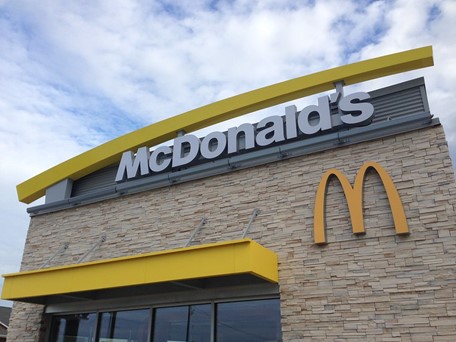McDonald’s: Holding Up Well During the Pandemic

By Brian Nelson, CFA
Nothing seems to be able to stop McDonald’s.
Remember the documentary Super Size Me (2004)? For those that may not have seen the award-winning film, director Morgan Spurlock filmed his experiences eating only McDonald’s food three times a day for a 30-day consecutive period. He made a point to eat every item on the menu, and if memory serves us well, anytime he was asked to “Super Size” his meal, he had to oblige.
The documentary measured the effects of eating only McDonald’s food on his health in just this short period of time. During his McDonald’s-binge, Spurlock consumed an average of 5,000 calories a day, roughly twice that of a healthy diet, and he ended up gaining 24 pounds in those 30 days, while increasing his cholesterol to 230mg/dl--not to mention other effects including fat accumulation in his liver. All of this happened in just 30 days.
The documentary ended up having a huge impact on consumer perception of McDonald’s, and the fast-food giant even ended up discontinuing its supersize portions as a result. It’s hard to believe that any company could sustain such brand damage and still thrive, but McDonald’s has not only recovered from repeated attacks on the healthiness of its menu items for years, but the company has managed to thrive through thick and thin.
A number of new healthier menu choices, the launch of McCafe years ago, and then all-day breakfast turning into a huge hit, despite the added complexities in the kitchen, have worked wonders. Over the past 5 years, McDonald’s refranchising initiatives have been a boon to profitability, too. McDonald's customers are not really the end customer, per se, but really its franchisees, which pay the corporate giant a mint to use its intellectual property/brand and know-how.
Just how well has McDonald's refranchising efforts worked? Since 2015 through 2019, the company’s operating income increased 27%, net income increased 33%, while earnings per share and dividends declared have steadily marched higher. Sure, it’s been a while since Super Size Me, but continued success only speaks to the company's moaty characteristics.
The fast-food giant reported third-quarter results November 9, and it registered better-than-expected performance on both the top- and bottom lines. Though McDonald's is certainly feeling the impact of the COVID-19 pandemic, with global comparable sales falling 2.2% in the period and adjusted consolidated operating income facing some pressure, diluted earnings per share, adjusted for the sale of McDonald’s Japan stock, advanced a solid 5% (4% in constant currencies).
The restaurant is even plowing ahead with dividend increases, raising its quarterly payout 3%, to $1.29/share or $5.16/share annually. This is good enough for a 2.4% forward annualized dividend yield. McDonald’s doesn’t register a good Dividend Cushion ratio, but that’s because of its enormous net debt position, which stood at $34.1 billion at the end of the third quarter. Debt is very punitive in the Dividend Cushion calculation.
That said, we think McDonald’s will have no problem handling its debt service costs. Standard & Poor’s and Moody’s give the firm investment-grade credit ratings of BBB+ and Baa1, respectively, so the capital markets are wide open for McDonald’s to pretty much do what it wants with its capital structure (as it has done). The company’s free cash flow has averaged about $7.6 billion during the past three years (2017-2019), too, easily covering dividends to the turn of ~$3.5-$4 billion on an annualized basis.
Concluding Thoughts
McDonald’s is without a doubt a fantastic enterprise with a storied history and moaty characteristics. The firm is holding up quite well during the pandemic and has managed to drive innovation to overcome almost every obstacle it has faced in the past. Though there are long-term risks to the dividend payout based on the Dividend Cushion ratio, the company’s credit marks and free cash flow generation are enough for us to be confident in a growing payout for the foreseeable future. Shares are fairly valued at the moment on the basis of our fair value estimate range, but dividend growth investors might want to take a hard look at this fast-food behemoth for their portfolios.
Brian Nelson owns shares in SPY, SCHG, DIA, VOT, and QQQ. Some of the other securities written about in this article may be included in Valuentum's simulated newsletter portfolios. Contact Valuentum for more information about its editorial policies.
0 Comments Posted Leave a comment